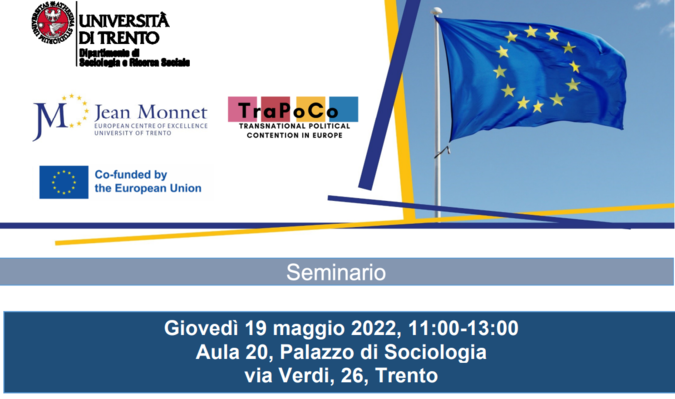Development of Environmental Activism in Contemporary Serbia and the Role of the EU

Seminar by Jelisaveta Vukelić, University of Belgrade at the University of Trento in the frame of the Jean Monnet project "Transnational Political Contention in Europe
At the beginning of the 21st century, environmental protests were rare and environmental problems were not frequently addressed in Serbia’s public sphere. As the European integration process intensified in the 2010s, this changed somewhat as international donors began to allocate financial resources to the development of environmental governance in Serbia. During this period, environmental civil society in Serbia consisted mainly of professional environmental NGOs. Their activities were supported by international donors and significantly shaped by European environmental policy. However, the work of these organisations lacked resonance with the local context so they were perceived as artificial and donor-driven, irresponsive to the needs of ordinary citizens. On the other hand, grassroots initiatives were rare and weak, unable to draw the general public’s attention to the pollution, over-exploitation of natural resources and environmental injustices.
However, the recent upsurge of environmental protest in Serbia suggests that the situation is changing and that grassroots environmental activism is gaining momentum. In the summer of 2019, for instance, residents of Belgrade’s Banovo Brdo neighbourhood organised a large protest against the construction of a sports hall in the protected Košutnjak woodland area. In the summer of 2020, several hundred activists and concerned citizens gathered in the small village of Rakita, in southwestern Serbia, to disrupt the construction of a mini-hydropower plant. This was part of a larger surge of protests against mini-hydropower plants that began in 2018. During the winter of 2019, people from Belgrade and some other towns in Serbia protested against extreme air pollution, raising awareness among the general public about the fact that Belgrade had topped the list of the world’s most polluted capital cities. In 2021 protests against Rio Tinto and the plans to mine lithium in Serbia erupted.
The role of the EU in environmental struggles in Serbia is contradictory. On the one hand, the adoption of European environmental regulations is part of the accession process. In particular, Chapter 27 (Environment and Climate Change) refers to the harmonization of national regulations with European environmental acquis. Regarding the implementation of these standards, Serbia has made a limited progress over the years. On the other hand, the European Green Deal and the resulting demand for clean and renewable energy produce contradictory effects. Namely, the exploitation of lithium needed for batteries for electric cars or the construction of mini hydropower plants as a renewable energy source, inflict devastation on the natural environment and local ecosystems.
The aim of this lecture is to provide an overview of the local environmental struggles in Serbia with particular focus on local actors and their perception of the EU institutions as a place to address their demands and complaints in the event that national authorities are deaf to their problems.
The seminar is organized within the Jean Monnet Chair “The European Union and the Western Balkans: Enlargement and Resilience” and the Jean Monnet Network “Transnational Political Contention in Europe”.
The face-to-face seminar is aimed at students of the course "Europe and its neighbours".
For all other interested people, to participate please contact roberto.belloni@unitn.it by May 17th. The link to access the streaming will be sent to each participant before the event.

